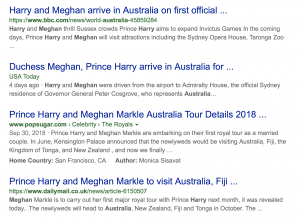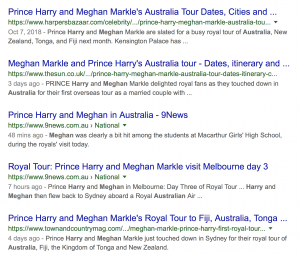Bing and Google: How are the Search Algorithms Different?
https://www.wired.com/story/tried-bing-search-google-microsoft/
Like many people, Brian Barrett usually only uses Google. Not surprising, given that Google takes up almost 90% of the search engine market share according to the article. For the purpose of science, Barrett switched to Bing search for a month and discovered a few interesting things. He found that Bing search largely provided the information he needed when he performed a general search; he did not encounter any outrageous search results from Bing. He did notice that Bing search and Google search bring up results in different orders. The discrepancy results from the different ranking algorithms the search engines used to decide which webpage to display. Google uses the PageRank algorithm, which is based on the authority score of an inlink. Bing uses hubs and authorities to rank the search results. Hubs and authorities affect each other during each round of update; a hub that links to a higher authority gets a higher updated score and an authority that got links from high-value hubs gets a higher updated score.
Even though Barrett did not encounter any horrible errors made by Bing, he noticed that Bing was a little bit slow on updates. He found that a Bing search for “duck duck goose Netflix” brought up results of the 2005 movie instead of the new Netflix animated movie. Comparatively, Google is much faster with updating its search results. Bing’s slower update probably resulted from its hubs and authorities ranking algorithm since establishing a list of high-value hubs and a list of highly endorsed authorities take time. Once Bing establishes a list of high authority sites, it probably does not update until a few weeks later. It meant that Bing might return older, more established website results rather than from a newer website with the more relevant information. For fresher information, Google appears to be a better choice than Bing. For Google, if a website has an inlink or outlink, it becomes a part of the graph and starts to give off or receive a PageRank value.
To see the difference in action, I tried to search “harry Meghan Australia” in both Google and Bing. The first four results from Bing are from BBC, USA Today, PopSugar, and DailyMail (Figure #1). These are all well-known, popular websites across the globe that have a long history. On the other hand, Google’s first five search results are from Harper’s Bazaar, the Sun, 9 News, and Town and Country Magazines (Figure #2). Arguably, these websites are less “globally established” than the websites mentioned previously for Bing. However, 9 News seems to be an Australian news outlet, so it actually might provide newer updates on the Royal Tour. The different effects of the two algorithms are obvious here. Even though Bing can still give me the results I need ultimately, I think I will stick with Google like Barrett eventually did.
Figure #1 Bing Search Results
Figure #2 Google Search Results


